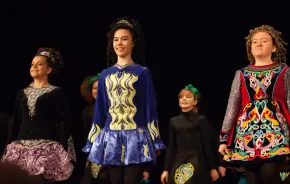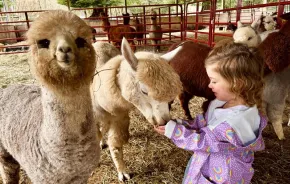
As parents we face conflicting impulses. We want to protect our kids from the horrible things that happen in the world. We want to let them play in peaceful ignorance, untroubled by thoughts of school shootings, terrorist bombings and hate crimes. But we also need to prepare them to live in a world where these things are realities. And we want to ensure that our kids have the empathy and knowledge to be agents of positive change when faced with hatred and injustice.
It's hard for us to know when and how to talk about difficult subjects. Who wants to bring up genocide at the dinner table?
For Fumiko Ishioka, teaching children about the darkest days of world history was her job as curator of the Holocaust Education Centre in Tokyo, Japan. To humanize the topic for her students, she obtained a personal artifact – a suitcase that belonged to a young Czech girl named Hana Brady, one of 1.5 million Jewish children killed in the Holocaust. But the efforts she made to uncover the life story of the girl who owned the suitcase went far beyond any job description.
Through her diligent efforts, Ishioka discovered that Hana's older brother George had survived the Holocaust (the only member of his family to do so) and was living in Canada. Ishioka visited Brady; their meeting became the subject of a CBC Radio documentary. The producer, Karen Levine, went on to write a children’s book, Hana’s Suitcase, which presented Ishioka’s quest for information and George Brady’s answers. The book uses simple, matter-of-fact language to present hard truths in a way that children can process. Playwright Emil Sher developed a script adapting the book for the stage, which debuted at Toronto's Young People's Theatre in 2006.

The play Hana’s Suitcase begins with Ishioka and her students searching for information about Hana Brady. Through their efforts to learn the truth, they model a healthy approach to studying past horrors that audiences can adopt. Ishioka and her students mourn the victims of the past, but never forget that their biggest job is to maintain empathy and respect for all people now, in the present.
Hana’s Suitcase is not only about memorializing something horrible that happened, but also about using the knowledge of the past to help us make kinder choices in the future.
“Fumiko, being an educator of youth, her commitment and dedication [is] to pass this story around the world and try to teach the importance of learning about different cultures and learning about the best parts of all different peoples," says Sheri Biller, cofounder of the Biller Family Foundation, which has led an effort to bring Hana's Suitcase to American audiences.
When Biller first heard about Hana’s Suitcase, she immediately knew this was the kind of artistic content that the Foundation was formed to support.
“We see this topic often in plays for adults. The fact that this one is so beautifully written, with an outcome that is so hopeful, and its message is for children makes it unique,” Biller says.
It wasn’t until a meeting with Seattle Children’s Theatre Artistic Director Linda Hartzell, though, that she found the right partner to bring Hana’s Suitcase back for its first U.S. performance since 2008. The show, staged by Toronto-based Young People’s Theatre (YPT) in Toronto, will be presented at Seattle Children’s Theatre from Jan. 21 through Feb. 7, and will be accompanied by a variety of educational and audience engagement activities.
George Brady, his daughter Lara Hana Brady, Fumiko Ishioka and playwright Emil Sher are in Seattle this week, visiting classrooms of students who have read the book. (Hana’s Suitcase on Stage, which includes both the original book and the script, is one of the selections for Seattle Public Library's 2016 Global Reading Challenge for fourth and fifth grades.)
Wednesday morning, they visited Sanislo Elementary School, recorded as a Google Hangout (watch and listen above), where the children’s questions ranged from quixotic to penetrating. “Kids’ questions are not always deep; sometimes they are funny. But they are interested and learning,” Brady says. Brady and the others will participate in an audience Q&A after each performance of Hana’s Suitcase during opening weekend.
“It’s my biggest hope that parents will go to see this with their children and it is a catalyst for starting a dialogue," says Biller.
"I think today, the issues of hatred are so apparent. Even in our political arena that we’re looking at every day, I don’t think parents are aware of what the impact is on young children." she says.

Special events around the Seattle Children's Theatre's production of Hana's Suitcase
- Teen tix performance: On Thursday, January 21, there is a Teen Tix performance, when tickets for teens (advance purchase only) will be $10 and the post-show talkback will be filmed by KCTS and posted online.
- During the play's opening weekend (Jan. 21–24), George Brady, Fumiko Ishioka and playwright Emil Sher will be in Seattle and will participate in an audience Q&A after each performance of Hana’s Suitcase. “For George and Fumiko this happens to be a story about a child in the Holocaust, but we all have to remember we can put anybody in Hana’s place. It is really a story about anybody’s history and more importantly it’s about what’s happening today,” Biller says.
- An online study guide gives parents and teachers background information on significant elements of the play and less familiar aspects of WWII history that are important to Hana’s story.
If you go..
When: Hana's Suitcase will be performed at Seattle Children's Theatre, Jan. 21 through Feb. 7
Age recommendation: Hana’s Suitcase is recommended for audiences age 10 and older.
Tickets: $33–$40; buy online
Note: This production is presented in part by the “Friends of Hana’s Suitcase” committee, a community effort led by the Biller Family Foundation.











